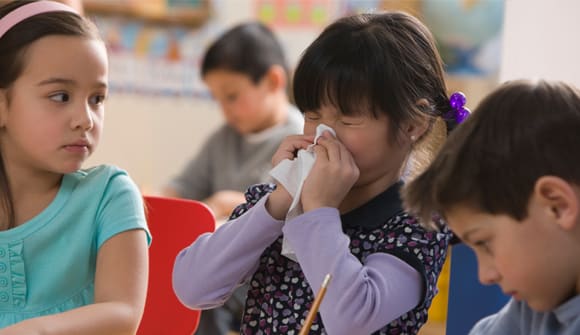Ah ah choo!
A cold and flu survival guide for parents.
Article Author: Vikki Mioduszewski
Article Date:

With fall now well underway, cold and flu season is in full effect. Young children are more susceptible to the sniffles, sharing germs at preschool or the playground with the pass of a ball or high-five. Even with the best germ prevention and hand-washing practices, your child is bound to become ill.
When your child starts to show symptoms, it can be difficult to tell what exactly is causing their plight: is this just a common cold, do they have the flu, or is it strep? Should I treat the symptoms at home, or should I call the pediatrician for an appointment? They have a fever: should they stay home from a playdate, daycare, preschool or the park?
Even though all parents worry every time one of their children gets a virus or infection, it's not all bad news. Kids need these viruses to make new antibodies that build up their immune systems, which aren't fully developed yet.
Experts with Wolfson Children's Hospital shared some key pieces of information to keep in mind as we navigate the school year.
Keep germs at bay
Mark Bedard, DO, a pediatrician with Orange Park Pediatrics, said, "Germs are everywhere. Unless we live in a bubble, we cannot avoid them altogether. But you can avoid spreading germs to others."
Some ways to avoid spreading germs include:
- Letting others know when you or your child is sick. Don't pretend everyone's well, because that could cause those around you to not take proper precautions to avoid your germs.
- Teaching children to sneeze and cough into their elbows or cover their mouths. Most respiratory bugs spread easily when airborne, while other germs like to rest on surfaces and can live there for up to 24 hours.
- Clean and disinfect all surfaces regularly.
- Wash your hands! Hand sanitizer is great and simple, but nothing beats washing with soap and water.
Strengthen your child's immune system
When you send your kids to preschool or daycare, exposure to germs and viruses is unavoidable. But, don't let this deter you from allowing your child to experience the world around them.
Dr. Bedard explained, "Exposure to germs is actually the best way to build an immune system – hence, the idea behind immunizations."
Healthy living, along with immunizations, like the flu shot, can keep bodies fighting strong.
Know the difference: Viral infection vs. bacterial infection
Mark Toney, MD, a pediatric hospitalist at Wolfson Children's Hospital, explained, "Infections are caused when different pathogens enter the body. The two most common types of pathogens are viruses and bacteria. Viruses are microscopic agents that live and replicate inside a human cell. Bacteria are single-celled organisms that, unlike human cells, have a cell wall."
To keep it simple, just remember that a cold and the flu are viruses, and illnesses like strep and whooping cough are bacterial infections.
"Treating a viral infection versus a bacterial infection is very different," explained Dr. Toney. "Most viral infections are cared for with over-the-counter medication, while bacterial infections are treated primarily with antibiotics to target the bacteria and either kill it or keep it from replicating."
Watch for a fever
For some, with a cold or other infection comes a fever.
"A fever is typically the easiest way to know if you or your child is sick," said Dr. Bedard. "It's an obvious symptom that doesn't require the child to be verbal, it's not vague, and it's measurable via a thermometer at home. This helps parents to know when to keep their children home to help prevent the spread of germs."
Many preschools and daycare centers have a strict rule that the child must be fever-free for 24 hours without the use of over-the-counter medicine before returning to school.
Trust your gut
You've determined your child is sick: he has a fever and just is not acting like himself. Will the over-the-counter remedy be enough? Or is it a bacterial infection, like strep, that requires an antibiotic for treatment? When should you take your child to the pediatrician or the emergency room? Or should you stay home?
Anthony Pohlgeers, MD, a pediatric emergency medicine physician with Emergency Resources Group and Wolfson Children's Emergency Centers, encouraged, "Trust your gut. Your pediatrician can help diagnose your child as well as provide treatment recommendations. But ultimately, if you think it's an emergency, don't hesitate, and just call 911. You know your child best."
Talk to a pediatrician if you have questions about your child's health
Together, Baptist Health and Wolfson Children’s Hospital provide all types of care for kids, including primary care, specialty care, emergency care, imaging and more.



